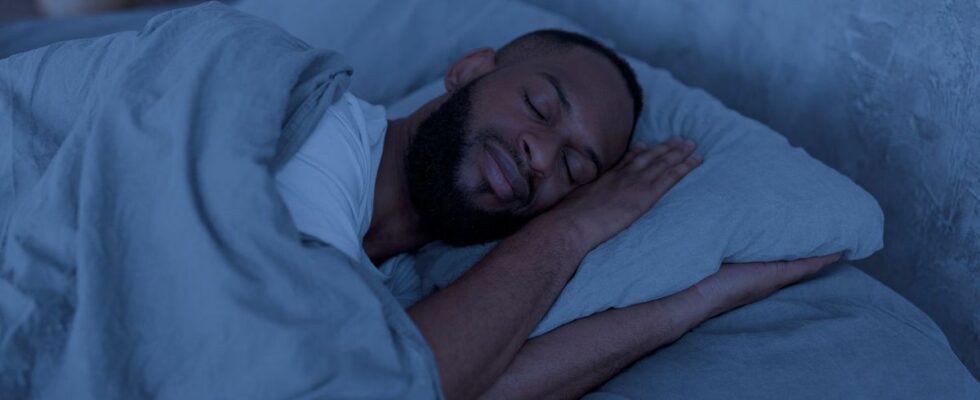Published on
updated on
Reading 4 min.
Marie Lanen
Head of parenting sections (baby, pregnancy, family), psychology and beauty

Despite growing awareness of good practices to improve the quality of sleep, the French struggle to change their habits. According to Dr. Rémi Lombard, expert in sleep disorders for Wopilo, many preconceived ideas persist, while a more nuanced approach would significantly improve nighttime rest without disrupting daily life.
Dr. Rémi Lombard, specialist in sleep disorders and expert for Wopilo, emphasizes that although the French know the recommendations to improve their sleep, they rarely apply them. For example, 74% watch series before sleeping and 42% play on their smartphone, despite advice to avoid screens. In addition, 47% eat large meals, often watered down, before going to bed, against the advice of experts. Result: 54% of French people say they are dissatisfied with their sleep but do not change their habits. Yet, according to Dr. Lombard, “it is possible to improve your sleep without drastic sacrifices. Certain recommendations must be nuanced according to each individual“.
Misconception #1: never exercise before sleeping
It is true that physical exercise causes the secretion of cortisol, a stimulating hormone that can delay falling asleep. However, it also releases calming endorphins, useful against stress. So what is the impact on sleep? “The idea that sport harms sleep comes from a study of sedentary people who suddenly returned to activity“, nuance Dr Rémi Lombard. “A lot of research now shows that the hour of practice has little impact. The American Sleep Foundation even recommends exercising whenever you want. The only precaution: avoid very intense efforts just before sleeping. But moderate activity, practiced one to two hours before bed, does not affect sleep and is preferable to inactivity.“.
Received idea n°2: get up and go to bed at the same time every day
Undoubtedly one of the most difficult pieces of advice to apply, because it assumes an extremely regular existence, without a social life, without sleeping in or the slightest unexpected event… a prospect that is not terribly exciting! “In reality, the important thing is not to go to bed at a fixed time, but to listen to your body, and go to sleep when you feel the need.“, explains Dr. Rémi Lombard. “You can feel exhausted at 10 p.m., after a day where you exerted yourself a lot, and in great shape at midnight the next day, following a calmer day. In both cases, only one option: go to bed, do not try to resist sleep, whatever the time. On the other hand, I advise always getting up in the same time slot: this allows you to send the brain a message of wakefulness, of activity, at the start of the day. This stabilizes the biological clock, responsible for sleep-wake alternations.“.
Received idea n°3: prohibit screens two hours before sleeping
Here again, it’s all a question of measurement… and realism: concretely, 45% of French people, despite this extremely well-known recommendation, look at a screen in bed before falling asleep. “For me, the problem mainly lies in looking at a screen too closely“, specifies Dr. Rémi Lombard. “Concretely, the blue light emitted by screens blocks the production of melatoninwhich disrupts the biological clock and blocks falling asleep. But this only applies to screens viewed very closely, such as the smartphone. When watching television, at a greater distance, the impact on melatonin still exists, but decreases very significantly. I therefore advise limiting smartphone use, but I see no reason to deprive yourself of a relaxing or entertaining program watched on a television… preferably somewhere other than in the bedroom. The important thing is to have fun!“.
Received idea n°4: the omnipotence of the “sleep train”
The “sleep train” is one that should definitely not be missed, otherwise it will lead to inevitable insomnia: in short, if we do not fall asleep at the exact time our body needs it. , we will have missed this train, which will not return until 2 hours later. “This belief is linked to the functioning of the biological clock, which in fact clearly tells us when it is time to go to sleep“, recalls Dr. Rémi Lombard. “But it does not reign alone over our sleep. When we consume energy, it produces waste. This waste accumulates in our brain, and it turns out that it is sleep-inducing. So, the longer we stay awake, the more sleeping waste we accumulate, which will eventually allow us to fall asleep. Bottom line: if it remains advisable to “get on the train” by respecting the signals that our body sends us, and by going to bed at the first yawn, missing this train is not dramatic: falling asleep will occur when even after a certain period of wakefulness, when our brain has accumulated enough waste“. So there’s no need to worry about not sleeping all night because you missed the slot!
Consult a doctor online for your sleep problems
Received idea n°5: only the mattress matters to ensure good sleep
Because it is on them that most of the body rests, the mattress, like the box spring, of course plays a crucial role in the quality of sleep. But the pillow, too, plays an important role in ensuring a good night’s sleep, because it allows optimal rest for the neck. A pillow that is too hard or too soft can cause pain and prevent you from sleeping well, or cause you to wake up unexpectedly. A pillow must therefore be chosen with as much care as a mattress, and above all it must be renewed very regularly: every three to four years on average, it becomes essential to replace it, because its filling sags, and no longer provides enough neck support.

